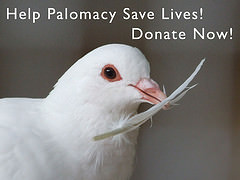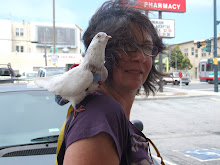Ringneck Doves as Pets, guest post by Cathy Kendall
Ringneck Doves as Pets
Guest Post by Cathy Kendall
Doves make excellent pets. I’ve kept—and loved--many species of birds including geese, chickens, pigeons, parrots and finches, but I have a special place inmy heart for doves, especially Ringnecks. They are beautiful, gregarious, friendly birds and are easily cared for. They don’t bite or screamand they will amuse you with their antics. Their generally peaceful, easy-going ways make them a good choice for both experienced and first-time bird adopters.
Ringneck Doves can be kept indoors or out. Single doves can become quite affectionate and attached to their owners; however, they are social and are happiest with dove companions. Same-sex companions can live happily together or they can be kept in pairs or smallflocks. Should you adopt a true pair you will need to replace the hen’s eggs with artificial ones, a practice we call “birdy birth control.” Because they breed so readily in captivity, there are many domestic doves in need of homes so it’s not advisable to raise more doves. All too often MickaCoo Pigeon & Dove Rescue is contacted by someone who has suffered a change of circumstance and must suddenly attempt to find homes for a whole aviary full of doves. It is not a happy situation for the doves or their owners.
A single pet Ringneck Dove may be housed in a cage at least 24” x 30” though larger is always better. A dove kept in a cage that size should be allowed daily supervised time out of the cage for exercise and interaction with her people. A flight cage 62” high, 32” wide and 21” deep makes a suitable indoor home for a pair of Ringneck Doves.
If you plan to keep your doves outdoors, and they love sunshine and fresh air, you will need to build a sturdy aviary. The aviary must provide shelter from cold, wet weather as well as protect the doves from hawks, raccoons and neighborhood cats. This is accomplished by using welded wire with openings no larger than ½” square. The enclosure must also keep out rats and mice. An attractive aviary can be a lovely addition to your yard. When properly constructed it should require just a few minutes each day to keep your doves happy andhealthy and you will enjoy many pleasant hours watching them. They are hardy birds and do not require supplemental heat during our mild Bay Area winters.

A word of caution if you plan to adopt multiple doves: though generally peaceful, male Ringnecks can be quite territorial and it’s recommended that you allow four square feet of floor space per pair. (MickaCoo highly recommends under-crowding as a way to minimize stress, illness, risk of injury and expense.)
Doves have the same basic feed and care requirements as pigeons: a grain mix containing between 12-16% protein, pigeon gritand clean water. I feed my doves a high quality cockatiel mix with extra safflower seed added as a treat. I frequently provide my Ringnecks and with millet sprays, which they enjoy very much. They love greens and minced veggies and happily devour well-washed romaine lettuce leaves several times a week.
Ringneck Doves have been bred in many color variations including pure white, tangerine, pied and orange in addition to the deep gray-and-lavender wild type. They don’t come in bright colors like parrots, but their soft colors are lovely nonetheless. When properly cared for they can live for 20 years, so you can enjoy their companionship for a long time. If you are looking for a gentle, beautiful, undemanding pet, a dove just might be the right bird for you.
MickaCoo has many doves in need of adopters!
Please visit these links for more information:
Tweet
















9 Comments:
i want one orange ringneck dove
Thank you for your interest in adopting a rescued dove. Please visit our Adoption page here to find the application- http://www.pigeonrescue.org/birds/apply-to-foster-or-adopt/
I live in Southern MD. A Feral Ringneck dove has come to my house. I talk to him and he is not afarid of people. Do you think he could be an escapee and what should I do to keep him safe
Anonymous- we call what this bird is trying to do "self-rescue". Sounds to me like he is seeking your help. You'll need to find a local dove-loving expert to help you best help him. Here's a link to info that will get you started- http://www.pigeonrescue.org/resources/
Thank you for helping him & good luck to you both!
Hi I have 3 Male Ringneck Doves and 1 Female.
Over the past month she has been pestered by all the Males and has laid 2 eggs on the floor...(one broken & one freezing cold)Dead ??
And NOW 1 egg in a little nest.
My Avery is large & has a nice warm coup for them to sleep in BUT SHE has decided to use the nest OUTSIDE (and it was -2 last night)
I am also worried about the other male Doves IF this baby survives.
Will they try to KILL the Chick ?
HELP !!! Please XXX
Thanks Nick.
Hi, Nick-
Yes, three males are two too many for one female Ringneck dove. And please- don't breed any babies! There are way too many already that are literally dying for lack of homes. It would be great if you could trade one of your male doves for a female (so that you'd have 2 and 2) and you need to get some fake eggs to replace the real ones with so as to prevent breeding. And yes- the baby is at serious risk of being injured or killed by the males. Also, if your female Ringneck is nesting "outside" of the aviary, that means that predators can get to your birds. They are all at risk. Where are you located? Here's a link to info about using fake eggs for birth control- http://www.pigeonrescue.org/birds/care/pigeon-dove-birth-control/
Hi all, over the past 6 months I have been feeding up to 6 ringneck Doves in our backyard. Started out as a pair, then there were 6 and now it varies.
i do not know where the "live" but come to the feeders daily.
I am in Pacifica.
We have had a pair of dives for almost ten years. They live in a custom built birdcage. As if recent we are considering selling both, doves and cage. If they are relocated, would that have detrimental effect on them.? Us it possible for them to die..?
It all depends on what kind of home you find them. Why not just have someone babysit them for you while you're gone? There are way too many birds in need of homes and not enough good adopters out there. Please don't think of them as items to be sold but instead, friends or family members who depend on YOU.
Post a Comment
Subscribe to Post Comments [Atom]
<< Home